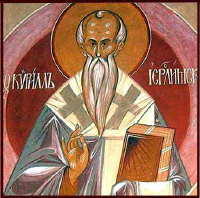 A new edition of Excuse Me, Ghidorah? has been uploaded. As Brak would say, "I hope you luv it..."
A new edition of Excuse Me, Ghidorah? has been uploaded. As Brak would say, "I hope you luv it..."You can find it thru iTunes or at podcast.net. It should show up at podcastalley.com pretty soon, too. Or you can hit the link to the right here.
This edition -- "Narnia Unbound" -- is an interview with Peter Kreeft about C. S. Lewis and the Oxford Globetrotters (otherwise known as The Inklings). The discussion ends up hashing out some basic assumptions about the sense of wonder -- prompting the listener to wrestle (I hope) with whether wonder is illusory (a whiff of something cooking where there is no actual meal), or a sound struck in the soul by an insistent Reality.
The outcome of that wrestling match, I believe, determines whether we "pass by the dragon" on our way to "the Father of Souls."
I understand St. Cyril to imply the dragon is the devil and the dragon's claws, teeth, and fiery breath are temptations. The wrestling match over the nature of wonder, I believe, has to do with a particularly sneaky sort of temptation. The temptation to believe wonder and beauty are flimsy and false is simply part of the zeitgeist, the spirit of the age, and we embrace it by osmosis. As Flannery O'Connor once put it, "If you live today you breathe in nihilism. In or out of the Church, it's the gas you breathe. If I hadn't had the Church to fight it with or to tell me the necessity of fighting it, I would be the stinkingest logical positivist you ever saw right now."
When each of us faces a moment of ultimate choice -- when we hurt, it seems, more than we hope -- it won't be our ability to recite Christian formulas that will save us. Rather, it will be our allegiance to the reality those formulas clarify and preserve. It will be something like loyalty to or friendship with that reality. It will be the degree to which we actually honestly believe God is good and the degree to which we are personally, unbreakably loyal and affectionate and partial to Jesus. It will be a deep test of the will. In the face of a catastrophe, when the last thing I feel is "good" or "worshipful," do I still say that the beauty in this world is not a cruel joke, but an expression of ultimate reality? Do I still say that evil is a temporary and parasitic thing, that the Good is real and everlasting and ultimately unshakeable?
It helps to hear someone explain that evil is a "dependent reality." It helps to know that disorder and disease cannot exist at all unless order and ease arrive first on the scene. It helps to know that if order and ease arrived first it follows that all things were good, that the whole of creation was good, before anything came along to take a swipe at it. It helps to have this as a reference inside yourself when nihilism sits on your chest and refuses to get off. This isn't dualism we're talking about here. That Imp of Nihilism sitting on your chest does not represent an Evil which is equally as powerful as the Good. No. At best, that Imp represents a blip in eternity. A terrible, painful, neverending and insurmountable blip it may, at times, seem. But anything that can be said to have begun right here on this day and eventually to end right there on that day is a piece of time and thus a blip when compared to eternity -- even if said blip consists of ten thousand "of your Earth years."
That's why endurance is so important on our end, rooted, as we are, in time and space. It is an endurance based on hope, a hope based on truth, and a truth that is commended to us by beauty and wonder (and, I think, whimsy, for lack of a better word).
In "Excuse Me, Ghidorah?" I hope to bring our presumptions out into the open. So that we know what we believe. So that when the dragon catches our scent, we already know what our response will be.
At the end of the podcast, I mention another podcast: The Golden Age of Comic Books. Look for it in iTunes or go to http://goldenagecomics.libsyn.com/. You won't be sorry.
Lint
